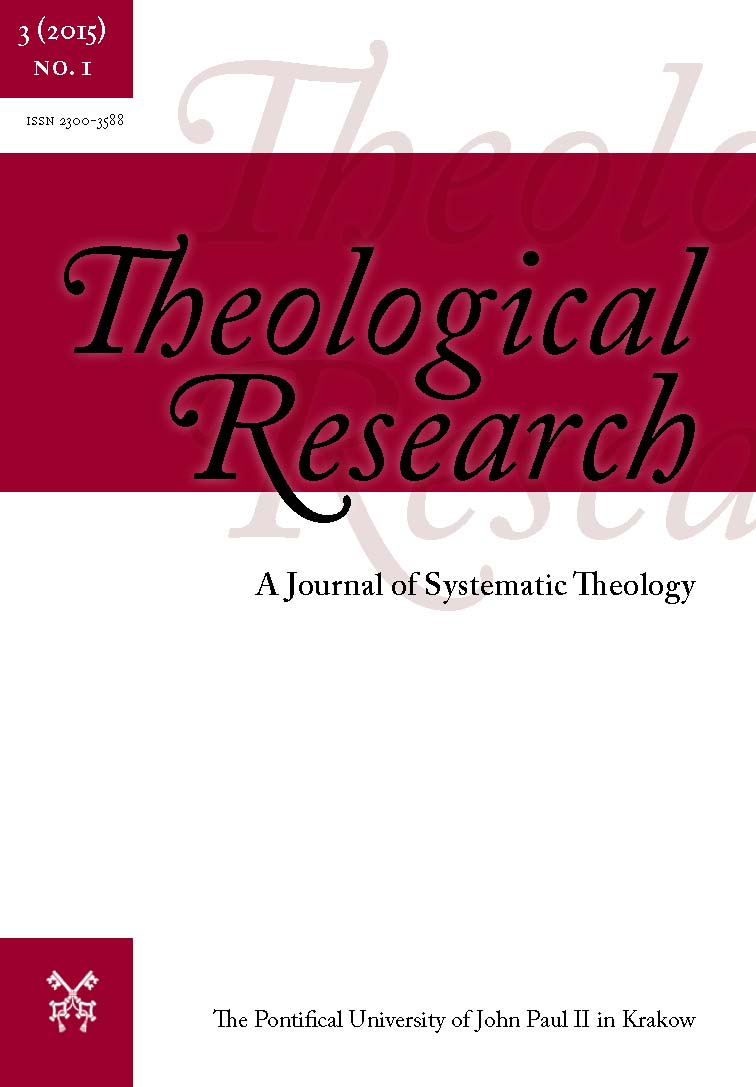Greek Models of Life up to Plato’s Philosophy and its Influence on the Christian Life in the Early Church
DOI:
https://doi.org/10.15633/thr.1679Keywords:
Homer, Hesiod, Pericles, Plato, the Spartans, the Pythagoreans, ancient Greek and Christian models of human lifeAbstract
This article deals with the issue of ancient Greek models of life up to the time of Plato’s philosophy. The author presents in a brief way the ideals in the writing of Homer’s and Hesiod’s, in the Pericleus’ speech from the Peloponnesian war, the Spartans, Pythagoreans and Plato’s model of life and education. Next he tries to describe how and which of these models were assimilated by Christians in the first centuries and which were rejected. The purpose of this article is to show how important ancient Greek culture and philosophy was for Christians not to mention the Greek language in which the New Testament was written. Understanding the development of theology in the early Greek Church requires knowledge of ideals and values which were important for people before accepting the Jesus Gospel.References
Baron A., Neoplatońska idea Boga, Kraków 2005.
Baron A., Świętość a ideały człowieka, Kraków 2013.
Baron A., Cultura animi w myśli greckiej (platonizm, arystotelizm, epikureizm, stoicyzm, medio- i neoplatonizm), in: Prace Komisji Filologii Klasycznej PAU, nr 46, ed. S. Stabryła, PAU, Wydział Filologiczny, Kraków 2015, 95–129.
Benedict XVI, Enc. Spe salvi.
Burkert W., Weisheit und Wissenschaft. Studien zu Phytagoras, Philolaos und Platon, Nürnberg 1962.
Chadwick H., The Early Church, Penguin Books, London 1978.
Diogenes Laertius, Vitae philosophorum, VIII.
Gajda-Krynicka J., Pitagorejczycy, Warszawa 1996.
Gregory of Nyssa, On the Beatitudes.
Hesiod, Theogony.
Hesiod, Works and Days.
Iluk J., Żydowska politeja i Kościół w Imperium Rzymskim u schyłku antyku, t. 1: Jana Chryzostoma kapłana Antiochii Mowy przeciwko judaizantom i Żydom, Gdańsk 2006.
Jaeger W., Paideia: The Ideals of Greek Culture, t. I–III, Oxford – New York 1939–1944.
Jamblich, O życiu pitagorejskim, trans. J. Gajda-Krynicka, Wrocław 1993.
Kulesza R., Starożytna Sparta, Poznań 2003.
Marrou H.-I., Historia wychowania w starożytności, Warszawa 1969.
Merki H., (Omo/wsi qe=. Von der platonischen Angleichung an Gott zur Gottähnlichkeit bei Gregor von Nyssa, Freiburg 1952.
Nicaea I (325).
Nicaea II (787).
Origen, On First Principles.
Paczkowski P., Filozoficzne modele życia w klasycznym antyku (iv w. p.n.e.), Rzeszów 2005, on page 181 he gives the title in English: Philosophical Models of Life in the Classical Antiquity (Fourth Century B.C.).
Plato, Cratylus.
Plato, Gorgias.
Plato, Laws.
Plato, Phaedo.
Plato, Phaedrus.
Plato, The Republic.
Plato, Symposium.
Plato, Timaeus.
Plato, Theaetetus.
Reale G., Historia filozofii starożytnej, Lublin 1999.
Reale G., Myśl starożytna, Lublin 2003.
Sinko T., Doskonały Grek i Rzymianin, Lwów 1939.
Srebrny S., Co zawdzięczamy kulturze świata antycznego, in: Teatr grecki i polski, elab. Sz. Gąsowski, introd. J. Łanowski, Warszawa 1984.
Stróżewski Wł., Wykłady o Platonie, Uniwersytet Jagielloński 1992.
Świderkówna A., Hellenika. Wizerunek epoki od Aleksandra do Augusta, Warszawa 1978.
Tetlow M., The Status of Women in Greek, Roman and Jewish Society, in: Women and Ministry in the New Testament,Paulist Press, 1980 pp. 5 – 29.
Thucydides, The Peloponnesian War.
Wolanin H., Słowotwórstwo w myśli językoznawczej starożytnej Grecji. Od Home-
ra do Dionizjusza Traka, PAU, Prace Komisji Filologii Klasycznej 24, Kraków 1996
Wyrwa D., Die christliche Platonaneignung in den Stromateis des Clemens von Alexandrien, Berlin-New York 1983.
Downloads
Published
Issue
Section
License
Autrzy publikujący w czasopiśmie "Theological Research" zgadzają się na następujące zasady:
a. Autorzy przenoszą na rzecz Uniwersytetu Jana Pawła II w Krakowie (UPJPII) autorskie prawa majątkowe do swoich tekstów.
b. UPJPII udostępnia teksty na platformie wydawniczej, na licencji Creative Commons Uznanie autorstwa-Użycie niekomercyjne-Bez utworów zależnych 3.0 Polska, która umożliwia ich pobieranie i udostępnianie (np. w repozytoriach naukowych), o ile zostaną spełnione warunki:
- podany autor i tytuł tekstu,
- podane miejsce publikacji (tytuł czasopisma i adres internetowy do oryginalnie opublikowanego tekstu),
- tekst będzie dystrybuowany w sposób niekomercyjny.

